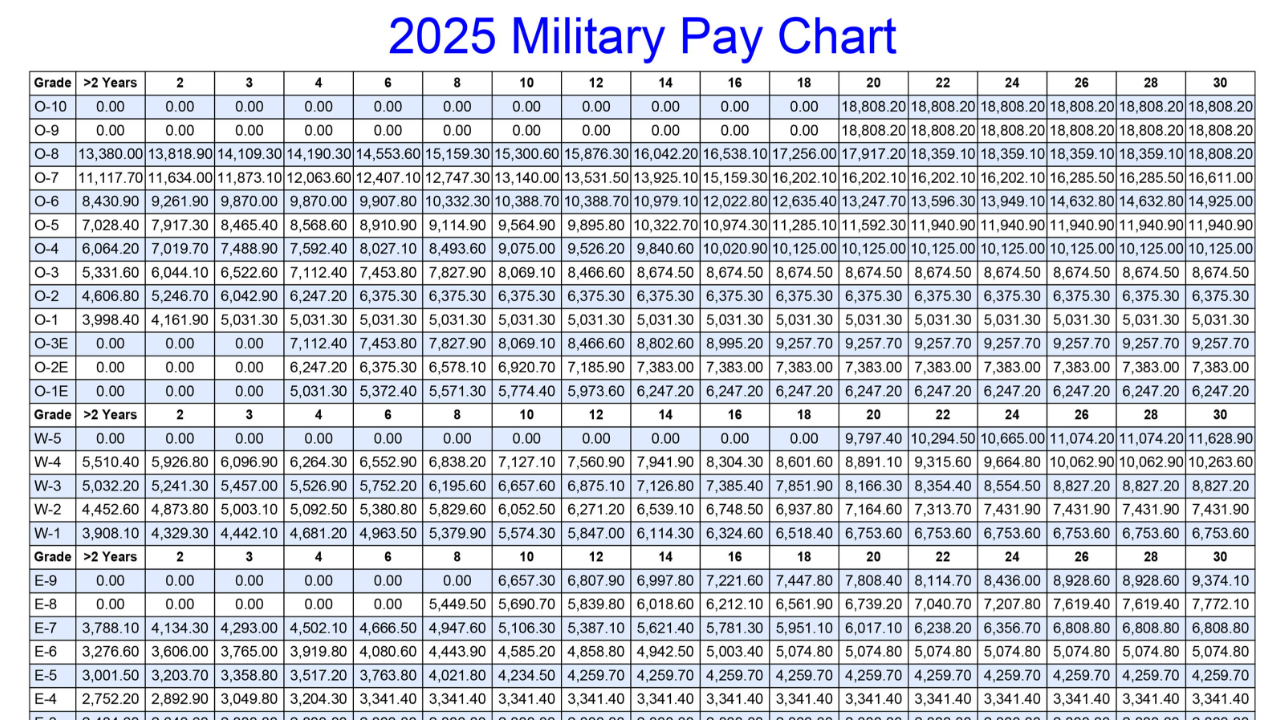Kudos to the Pay Chart

At times in my career, I felt like my pay was lower than what I wanted, but at least I could easily look at the military pay chart and project as to when a step increase was to be expected. It gave me something to look forward to. If I could work through a temporary frustration point or wait out a less than desirable leader, I could see the financial reward by increasing my time in service. I never appreciated the simplicity and equality of the military’s accessible pay chart until I did a short stint in the civilian sector.
In between my transition from active-duty to full-time Guard member, I worked in the private sector. I ventured into civilian healthcare; a world I had eagerly been waiting to get into since I was a teenager. It didn’t take long for all my presumptions and dreams about the healthcare field to come crashing down, especially as they related to access to care, hospital politics, and expectations of providers and staff, notably as it pertained to salary and bonuses.
I observed administrators skulking around clinical offices to discuss pay and bonuses. If one provider didn’t think that she was getting paid fairly and threatened to quit, money was “secretly” thrown to the provider. If another provider didn’t earn the bonus he was expecting because he didn’t see as many patients, he blamed the admin support staff, and then the staff would be the receivers of the pressure to perform. One nurse practitioner I worked with was irate as she learned a physician assistant earned a larger bonus than her even though her degree was a Master’s level and his was of a Bachelor’s (older times here). Other staff would lament that they had earned a “Christmas bonus” for the past ten years and had counted on it as part of their salary, but were in damn-near disrepair when the organization didn’t give them one in this particular year. One employee in another division was “promised” a raise after a probationary year, but after three years, still hadn’t received one. Hearing these conversations was exhausting, but I learned a lot.
Apparently, discussing salary is uncouth in the civilian sector, although it happens all the time. I cannot recall a time when I listened to or heard of military members discussing salary. Sure, there were (and currently are) times when people discussed promotion opportunities, which inherently is tied to pay. At least members know that higher rank means more responsibility and then more money, and not the other way around.
Military pay is tied to time in service and rank. Black and white. Bonuses are tied to very specific service obligations related to specific job fields that are hard to fill, such as emergency room physicians, HVAC technicians, or pilots. A finance officer with ten years of service as an officer and graduated from a small state college can expect the same pay as a human resources officer with ten years of service as an officer who graduated from Harvard or West Point. To take it a step further, a female member with the same years of service and rank can expect equal pay to that of her male counterpart, no questions asked. She’s not going to get secretly short-changed because she is of mother-bearing age and might miss work to start a family. And bonus - if she does have a baby while serving, she will get paid in full during maternity leave. But I digress….
Additionally, the pay scales and charts for federal employees are also quite visible and accessible. I once tried to find out how much my state governor made, and it was like trying to read the third loophole to a hundred-year tax code. I tried to look up how much professors are paid at a local college. Good grief! I quit after fifteen minutes wasted trying to investigate that mess. For ease of financial planning, the way in which the federal government makes pay information transparent is something to be recognized.
I have many friends who work in the job placement, recruiting, and veteran transition space. The lack of pay equality and transparency is a significant pain point they find clients have heartburn on. How can someone make an educated plan as to where they should work? Not just for military members departing service, but for anybody? Why waste their time with a company sharing a $20,000 pay range for a job when the organization knows damn well it is going to start everyone within the first $1,000-2,000 of the range. Just say it and save everyone the time.
The military isn’t perfect, but it has got this process down. Transparency leads to more informed employees and an improved culture of trust. Sometimes, military members should be compensated more than they are, but at least they know what and when to expect pay changes in their careers. Pay equality and transparency are components of the military pay system that should be appreciated.
Whether you're new to the military or have been in for ten years....
These 10 money tips will help make all the difference in you Living Your Best Military Life!

